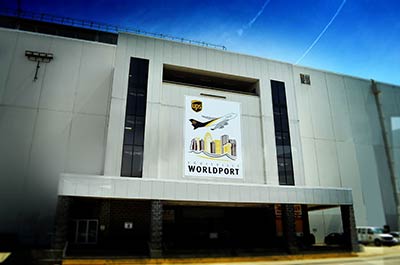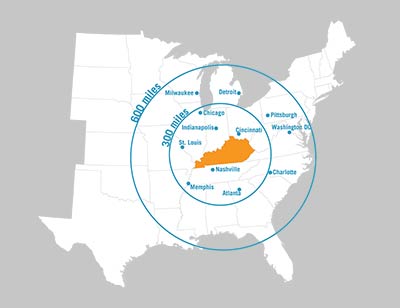 The UPS Worldport air cargo hub in Louisville, Ky., employs about 10,000 people and turns over cargo for 130 aircraft a day. Also in Louisville, UPS Centennial Ground Hub employs about 2,000 people. The strong UPS presence has helped attract more than 250 companies to the greater Louisville area, representing more than 13,000 jobs and a $300 million-plus payroll." />
The UPS Worldport air cargo hub in Louisville, Ky., employs about 10,000 people and turns over cargo for 130 aircraft a day. Also in Louisville, UPS Centennial Ground Hub employs about 2,000 people. The strong UPS presence has helped attract more than 250 companies to the greater Louisville area, representing more than 13,000 jobs and a $300 million-plus payroll." />
The unprecedented economic upheaval prompted by the pandemic sent shockwaves across the global economy, stalling years of progress in a relative instant.
While Kentucky was no exception, few other states are as well-positioned to rise and rebound as the Bluegrass State.
Kentucky's deep resources in advanced manufacturing, along with its fully formed supply chains, unparalleled air-cargo assets, an outsized logistics and distribution industry and a key geographic advantage have the state prepared to surge ahead.
In fact, manufacturing, service and tech industry growth has remained strong in Kentucky across the past six months. Since Gov. Andy Beshear took office in early December, the state recorded 126 proposed new-location or expansion projects across that range of industries, totaling more than $1.1 billion in planned investment. Those projects promise to create nearly 3,900 full-time jobs in the coming years, providing hope and opportunity for Kentuckians in every corner of the state.
In May, Kentucky saw eight new expansion and new-location projects announced, totaling $117.6 million in planned investment and promising to create nearly 760 new full-time jobs in the coming years. Those figures compare well to the pre-pandemic months of January - with $50 million and 342 announced jobs - and February with $337 million in planned investment and 691 new jobs.
Not only is Kentucky prepared to succeed across the coming years, but also to leap ahead in onshoring, securing foreign direct investment (FDI) and diving into emerging industries such as agritech. State leaders are emphasizing development of the commonwealth's agritech industry - a marriage of Kentucky's advanced manufacturing industry and longstanding status as an agricultural powerhouse.
Kentucky's manufacturing and logistics prowess paves the road to recovery
As one of its calling cards, Kentucky's nationally outsized manufacturing industry combines with its robust supply chain and highly skilled workforce to make the state a prime destination for onshoring projects. With about 4,500 facilities operating statewide, Kentucky ranks among the leading manufacturing states, having more than 13% of its workforce in manufacturing versus 8.5% nationally, according to the National Association of Manufacturers.
This dynamic manufacturing scene is helping Kentucky withstand the pandemic. Producers across the state stepped up to help solve one of the most significant initial challenges of battling the pandemic - the critical shortage of personal protective equipment needed to prevent the disease's spread.
Looking through the pandemic, Kentucky's manufacturing prowess has potential to attract FDI and onshoring projects to the state. One example is PRCO America Inc., a division of Puyang Refractories Group Co., one of China's largest publicly traded refractory companies, which is establishing its first US manufacturing plant in Hickory, Ky. The facility will produce custom-sized resin-bonded magnesia graphite refractory brick, which steel mills use to line their furnaces and transfer ladles. The $5.5 million project is expected to create 32 state-resident, full-time jobs in West Kentucky's Graves County and open by the end of 2020.
Like many of the 500-plus internationally owned facilities currently operating in Kentucky - the largest presence being from Japan and Germany - PRCO executives found Kentucky's ideal location and cost-effectiveness made the state a premier business partner. These advantages help explain Kentucky's national leadership in percentage of FDI-driven jobs, illustrating the state's ability to support businesses of any size from across the globe. In this instance, company leaders said they chose Graves County for its proximity to the Mississippi River for low-cost delivery of raw materials, as well as its central location among America's steel producers.

Kentucky's location advantages also support another mainstay industry, one primed for post-pandemic growth. As online ordering and home delivery methods continue growing in popularity - both in terms of usage frequency and for a broader range of goods - opportunity abounds for Kentucky and its more than 540 logistics and distribution facilities. That industry currently employs 75,000 people. Nearly a dozen Amazon distribution facilities across Kentucky make the commonwealth rank second only to the company's home state of Washington for number of Amazon employees. Growing reliance on overnight shipping and an increased role for the industry overall may well attract more logistics operations and help Kentucky compete for additional manufacturers looking to onshore in the pandemic's wake.
Kentucky is currently the nation's No. 2 air cargo state, thanks in large part to UPS, DHL and Amazon Air shipping hubs. As Amazon's new $1.5 billion facility at Cincinnati/Northern Kentucky International Airport gradually comes online, the state is on a fast track to become No. 1. Add in the hundreds of small and mid-size logistics companies that, by their nature, are adaptable to market shifts, and the industry appears poised for future success in Kentucky.
Emerging agritech industry yields growth potential in Kentucky
While these long-thriving industries are key in Kentucky's future economic prosperity, so too are the industries of the future. Of note is the emerging agritech industry, one that plays to Kentucky's strength in advanced manufacturing and its deep-rooted history as an agricultural powerhouse.
Leveraging technology in agricultural practices in ways that improve yield, efficiency and profitably, agritech is forging ahead with a global sense of urgency. The United Nations estimates the world needs to increase its food supply by 70% to feed a population that will include an additional 2.3 billion people by 2050, and tech products, services and applications developed and exported from Kentucky can contribute to solving this problem.
The building blocks are already in place, with about 70 ag-related manufacturers, service and technology providers already operating in Kentucky. One of them is Alltech, headquartered in Nicholasville just outside of Lexington. The company researches and delivers products for the sustainable nutrition of plants, animals and people, putting it at the forefront of innovation as it relates to the future of the agritech industry.
Another key project is underway in, Morehead, Kentucky, slated to become the home of the nation's largest greenhouse. Startup agritech company AppHarvest is constructing the $97 million high-tech greenhouse, which will grow produce year-round and span 2.76 million square feet. Company leaders plan to employ 285 people at the facility and ship up to 45 million pounds of tomatoes annually.
These current developments yield even more promise when considering Kentucky's potential to develop a robust workforce pipeline to support a variety of agritech jobs statewide. Those efforts will be supported through Kentucky's colleges and universities, the 16 schools across 70 campuses in the Kentucky Community & Technical College System and bespoke programs and multi-partner collaborations such as Registered Apprenticeships, the state's Work Ready Skills Initiative and the KY Federation for Advanced Manufacturing Education (KY FAME).
With an emphasis on both continuing to grow its major industries and gaining a foothold in emerging ones, the Bluegrass State is poised to not only recover, but prosper in a post-pandemic world.